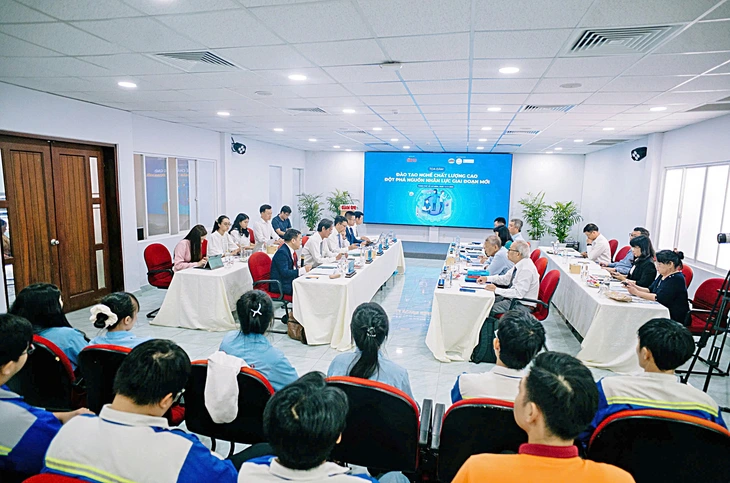
Seminar "High-quality vocational training - Breakthrough in human resources in the new period" organized by Tuoi Tre newspaper on November 11 - Photo: THANH HIEP
That was the opinion of experts and leaders of vocational training institutions at the seminar "High-quality vocational training - Breakthrough in human resources in the new period" organized by Tuoi Tre newspaper on the morning of November 11.
The discussion took place in the context of the draft Document of the 14th Congress setting the goal of "Developing a number of vocational training institutions, training sectors and occupations to reach levels equivalent to those of the region and the world ".
Resolution 71 of the Politburo on breakthroughs in education and training development also emphasizes improving the quality and efficiency of vocational education by promoting investment, restructuring the system, encouraging business participation and enhancing international cooperation.
Need to reposition the value of the engineering industry
For many years, the concept of success in Vietnamese society has often been associated with a university degree. Meanwhile, the vocational training sector, which directly trains the technical workforce, the foundation of every industrial economy, is often considered to be of a lower level. Therefore, the recruitment of students to vocational training institutions still faces many difficulties.
At the seminar, Mr. Le Thang Loi - Director of the Southern Center for Education and Training Development (Ministry of Education and Training) - commented: "Social prejudices prevent vocational students from being recognized for their true abilities. Meanwhile, businesses are "thirsty" for mid-level and high-level technical human resources. We are lacking a policy bridge to affirm the position of vocational education."
According to him, because of this prejudice, many students, despite their talent and suitability for vocational training, are still pressured to take university entrance exams. The result is a waste of social resources and an imbalance in the human resource structure. He believes that it is necessary to reposition the value of technical professions and at the same time build a worthy remuneration policy for vocational students so that they can confidently stick with the chosen path.
Having spent many years researching vocational education models in various countries, Dr. Nguyen Xuan Xanh affirmed: "Vocational education needs to develop in parallel with the country's industrialization. We cannot industrialize the country to move forward to prosperity without a developed vocational education system."
Raising the issue that after nearly 40 years of renovation, GDP per capita in Vietnam is only about 5,000 USD, while in just 40 years from the beginning of the 1960s, GDP per capita of Korea has grown from 100 USD to 20,000 USD, Mr. Xanh said that the reason is because Vietnam has not had a strong industrial revolution.
In Korea, part of the success of the industrial revolution is associated with vocational education models and highly skilled labor training centers. These are the "nuclei" that create a high-quality labor force to serve economic development.

In Vietnam, everyone thinks that going to university is the best path, while vocational training is looked down upon. Many colleges are even afraid to use the word "vocation" in their names for fear of being underestimated. But it is "vocation" that is glorious, because it creates material wealth for society. From this word "vocation" we can develop science, technology and modern industry.
Dr. Nguyen Xuan Xanh
Inseparable from the business
According to Master Nguyen Khanh Cuong - Principal of Lilama 2 International College of Technology, high-quality vocational education is currently facing many difficulties: high training costs, not really taken seriously, the input of "learners" is generally lower than that of university level. Meanwhile, when aiming for international standards, the teaching staff must meet strict standards, the training program needs to be transferred and internationally recognized.
Mr. Cuong suggested that Vietnam should build a unique vocational training model, in which businesses have clear roles and responsibilities, and at the same time form a companion enterprise fund to support schools in training human resources according to actual needs. Vocational training institutions also need to innovate highly applicable practice exercises and cooperate internationally to be recognized for their programs and output quality.
Similarly, Associate Professor Dr. Bui Van Hung - Principal of the College of Technology II - said that vocational training cannot be separated from businesses. Citing an example from his school, Mr. Hung shared that the way to do it is to send students for internships right after the first year and rearrange the facilities so that the school model is similar to that of a business. The school invites lecturers from businesses to participate in teaching and needs to have a policy to train these business lecturers because they have good practical experience but lack academic qualifications.
Speaking in the discussion, MSc. Lam Van Quan - Chairman of the Ho Chi Minh City Vocational Education Association - said that the difference of high-quality human resources today lies in the ability to self-study, self-work and have critical thinking thanks to the training process associated with businesses. Students not only study but also participate directly in real production, through which the school continuously improves training standards to keep up with practical requirements.
However, Mr. Quan also pointed out a major limitation that vocational training institutions currently lack a unified orientation framework, leading to difficulty in determining the development roadmap. According to him, it is necessary to soon build a three-level standard system: national standards, regional standards (ASEAN) and international standards to create a foundation for training and recognition of vocational capacity in the future.
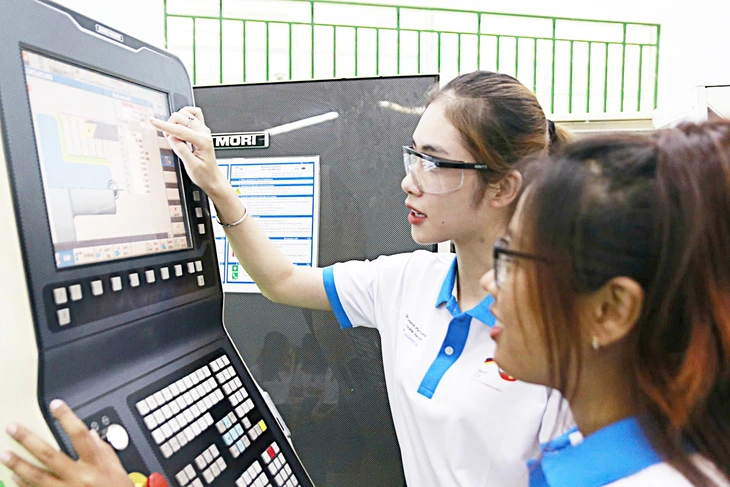
Students practice at Lilama 2 International Technology College - Photo: TRONG NHAN
Need to synchronize 5 elements
According to Master Nguyen Khanh Cuong, Lilama 2 International College of Technology was selected by the Governments of Germany, France and Vietnam as an excellent vocational training center with seven professions transferred from Germany and three professions from France.
From the German dual training model (70% at the enterprise, 30% at the school), the school has adjusted it to a joint enterprise training model to suit the conditions of Vietnam. The school has taken advantage of connecting enterprises with their own training workshops and invested in a "common center" located right at the school to cooperate in training with enterprises.
To operate this model, according to Mr. Cuong, five factors need to be synchronized: teachers meeting German standards, the program is transferred with the correct copyright, the practice facilities meet standards, businesses participate substantially, and the examination and assessment system follows German standards.
In fact, in many fields such as mechatronics, metal cutting, automobiles... graduates go straight to work at FDI enterprises such as Bosch, Mercedes or other German partners at a very high rate.
As for the cooperation program to train human resources for Long Thanh International Airport, Lilama 2 students will study the first year at school, and in the following years go straight to the workshop or maintenance department of partners such as ACV, SAGS... Students will have to ensure English (minimum TOEIC 450) and learn more specialized English to be able to participate in the maintenance of actual aviation equipment, meeting the international operating standards of Long Thanh Airport.
The important role of communication
The seminar "High-quality vocational training - Breakthrough in human resources in the new period" was accompanied by Lilama 2 International Technology College, Industrial College II and Kim Oanh Real Estate Group.
Sharing at the discussion, journalist Tran Xuan Toan - Deputy Editor-in-Chief of Tuoi Tre Newspaper - emphasized the important role of the press in connecting parties from schools, businesses to learners to promote change.
Tuoi Tre always wants to create a forum for experts, teachers and businesses to share opinions, give advice and suggest solutions to develop the vocational education system.
Source: https://tuoitre.vn/thay-doi-dinh-kien-ve-dao-tao-nghe-doanh-nghiep-dang-khat-nhan-luc-ky-thuat-20251112094628317.htm






![[Photo] Highways passing through Dong Nai](https://vphoto.vietnam.vn/thumb/1200x675/vietnam/resource/IMAGE/2025/11/12/1762940149627_ndo_br_1-resize-5756-jpg.webp)





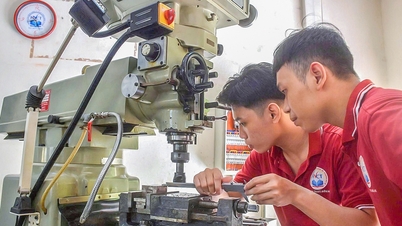


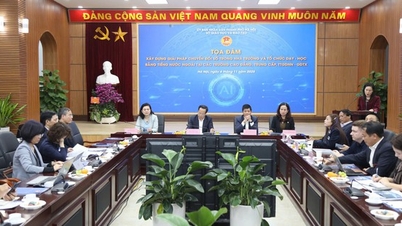

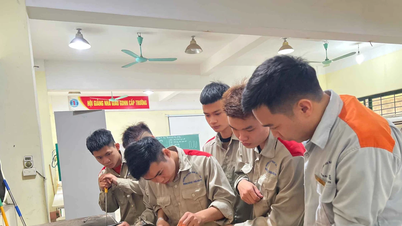
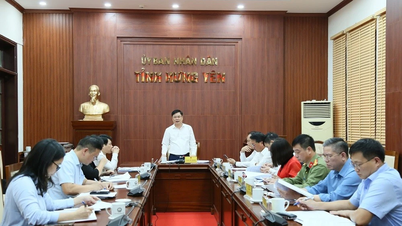


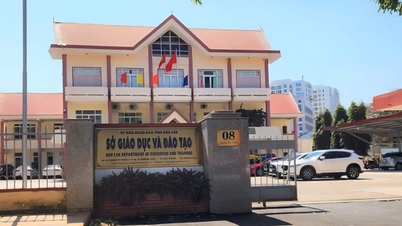


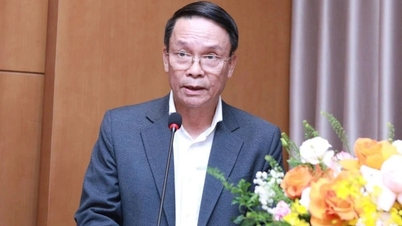










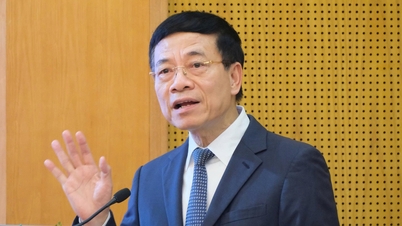








































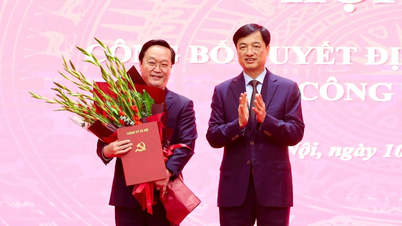



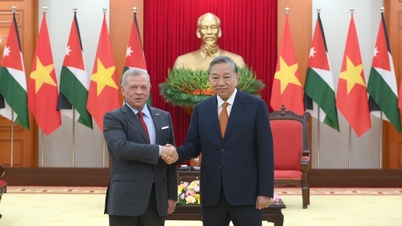
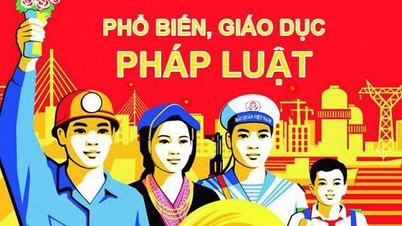






















![Dong Nai OCOP transition: [Article 3] Linking tourism with OCOP product consumption](https://vphoto.vietnam.vn/thumb/402x226/vietnam/resource/IMAGE/2025/11/10/1762739199309_1324-2740-7_n-162543_981.jpeg)








Comment (0)